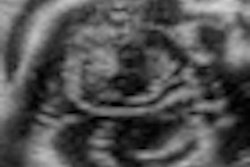Transcranial Doppler ultrasound studies show that U.S. soldiers often experience cerebral vasospasm and intracranial hypertension as complications from traumatic brain injuries, according to research presented at the International Stroke Conference.
A team led by Alexander Razumovsky, PhD, director of Sentient NeuroCare Services in Hunt Valley, MD, studied data from 122 traumatic brain injury patients who received transcranial Doppler ultrasound testing. Of these, 88 had penetrating head injuries and 34 had closed head injuries.
In anterior circulation vessels, 66% of patients in the penetrating head injury group and 13% in the closed head injury group had signs on transcranial Doppler ultrasound of post-traumatic vasospasm, or constricted blood vessels, the researchers found. In posterior circulation vessels, 64% of patients in the penetrating head injury group and 14% in the closed head injury group had signs of post-traumatic vasospasm.
In addition, more than 40% of traumatic brain injury patients had high intracranial pressure.
These findings are also applicable to and important for civilian traumatic brain injury patients, according to Razumovsky. Daily transcranial Doppler studies should be performed to recognize and manage these secondary complications of vasospasm and intracranial hypertension.



















